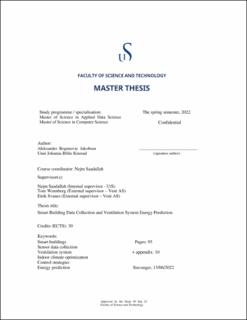| dc.contributor.advisor | Saadallah, Nejm | |
| dc.contributor.advisor | Wennberg, Tore | |
| dc.contributor.advisor | Svanes, Eirik | |
| dc.contributor.author | Jakobsen, Aleksander Bogunovic | |
| dc.contributor.author | Kinstad, Unni Johanna Blilie | |
| dc.date.accessioned | 2022-11-17T16:51:25Z | |
| dc.date.available | 2022-11-17T16:51:25Z | |
| dc.date.issued | 2022 | |
| dc.identifier | no.uis:inspera:92613534:22977031 | |
| dc.identifier.uri | https://hdl.handle.net/11250/3032539 | |
| dc.description.abstract | Data has the potential to transform our environments for the better if utilized to its full
potential. A highly interesting use case of data is in relation to Smart Buildings, where
IoT technology presents new possibilities. With appropriate collection and structuring
of the available data, many new opportunities present themselves.
In this thesis, a data gathering system is proposed for sensors in Arkivenes Hus. To
illustrate the potential in the data, one specific problem is researched, namely that of
indoor climate optimization and its effects on energy usage. The problem description
and the development of the data system comprises identifying governing system equations using sparse identification of nonlinear dynamics, control strategy using model
predictive control and various machine learning methods to predict energy usage.
For a one day simulation, the proposed optimization strategy yields a 174.86% increase
in energy usage. The conducted work indicates that the proposed model identification
technique is unsuitable for the underlying data utilized in this work. The proposed
model predictive control strategy and machine learning methods contain promising results. | |
| dc.description.abstract | | |
| dc.language | eng | |
| dc.publisher | uis | |
| dc.title | Smart Building Data Collection and Ventilation System Energy Prediction | |
| dc.type | Master thesis | |
